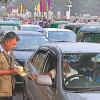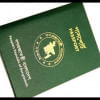For whom there is no toll

In the latest episode of government officials misusing their power, they have apparently been avoiding paying tolls on the roads, and under the Roads and Highways Department (RHD) exploiting a colonial era law. The Tolls Act, 1851 exempts "public servants travelling on duty" from paying tolls, but reportedly any and all vehicles now refuse to pay tolls, irrespective of whether the officers are on duty. In the process, they are costing the state a huge amount of revenue – according to a report by this daily, the government lost about Tk 27.37 lakh in the last month alone, as more than 24,000 vehicles carrying government officials did not pay tolls for the Dhaka-Bhanga Expressway and the Meghna and Ghumti bridges on the Dhaka-Chattogram highway. Given that the RHD collects tolls on four roads and more than 50 bridges across the country, the loss is too substantial to ignore.
We are appalled that government officials, whose first and foremost duty is to the state, are taking advantage of their offices to refuse to pay for the upkeep of the roads and highways. It is also unclear why such an old law is being invoked in the first place, given that there are more recent precedents and policies. For instance, the Toll Policy, 2014 stipulates that on-duty government officials will be exempted from paying tolls inside the area under their jurisdiction and their vehicles have to have government stickers. Meanwhile, the Bangladesh Bridge Authority (BBA), an agency under the road transport and bridges ministry, withdrew all toll exemption facilities on the Padma, Bangabandhu and Mukterpur bridges in March. In the absence of clear directives about the rest of the infrastructures, however, the RHD officials have been unable to put their foot down when government officials wave their badges.
It is at least encouraging that the Road Transport and Highways Division has finally flagged it as an issue and decided to write to the Cabinet Division and the Prime Minister's Office, seeking directives for officers of all government offices and agencies to pay tolls. We welcome their decision, and sincerely hope that they follow through with their proposals.
It has become an unfortunate norm in the country for anyone in a position of power to flaunt their authority and get undue advantages, often at the cost of the public and the state. Government officials are also citizens of the country, and should be afforded equal treatment by the state.


 For all latest news, follow The Daily Star's Google News channel.
For all latest news, follow The Daily Star's Google News channel. 









Comments